Want to Learn about Entrepreneurship, as a Software Engineer? Sell Something Online.
When I decided to write and sell my first ebook, The Tech Resume Inside Out, I expected to learn about the writing process. How to create a high-quality publication. How to work with editors. Designing a cover and illustrations for the book. And I have, indeed, learned plenty on these topics.
This article summarizes the seven product sales-related areas I've learned more about by doing, then by reading. The book publishing and sales experience felt like running a (very) small business as an enterpeneur. One that had zero risks: yet it uncovered areas I would have neglected had I started a business today.
So what did I learn? Marketing, media exposure, advertising, content marketing, SEO, customer support and accounting. Most of all, why selling something will teach you far more about any of this than just reading - including reading an article like this one.
1. Marketing
As software engineers, we're used to building things, shipping them, then moving on to the next thing. As I've been thinking about startup ideas, I've focused on the "is there a demand for this?" and the "how would I build this?" topics.
For the book, I spent 2.5 months writing, editing, and refining the content of over 200 pages. As the content was almost ready, I made a list of what I need to do for launch. Given the time and effort that went to the book - and how the beta feedback was clear that it was a great book for engineering resumes - I wanted to make sure that people who are either out of a job or applying for companies get to hear about it.
Marketing was an area I completely blanked on until this launch plan. Here's what that plan looked like - with each item tagged as content or marketing activity:
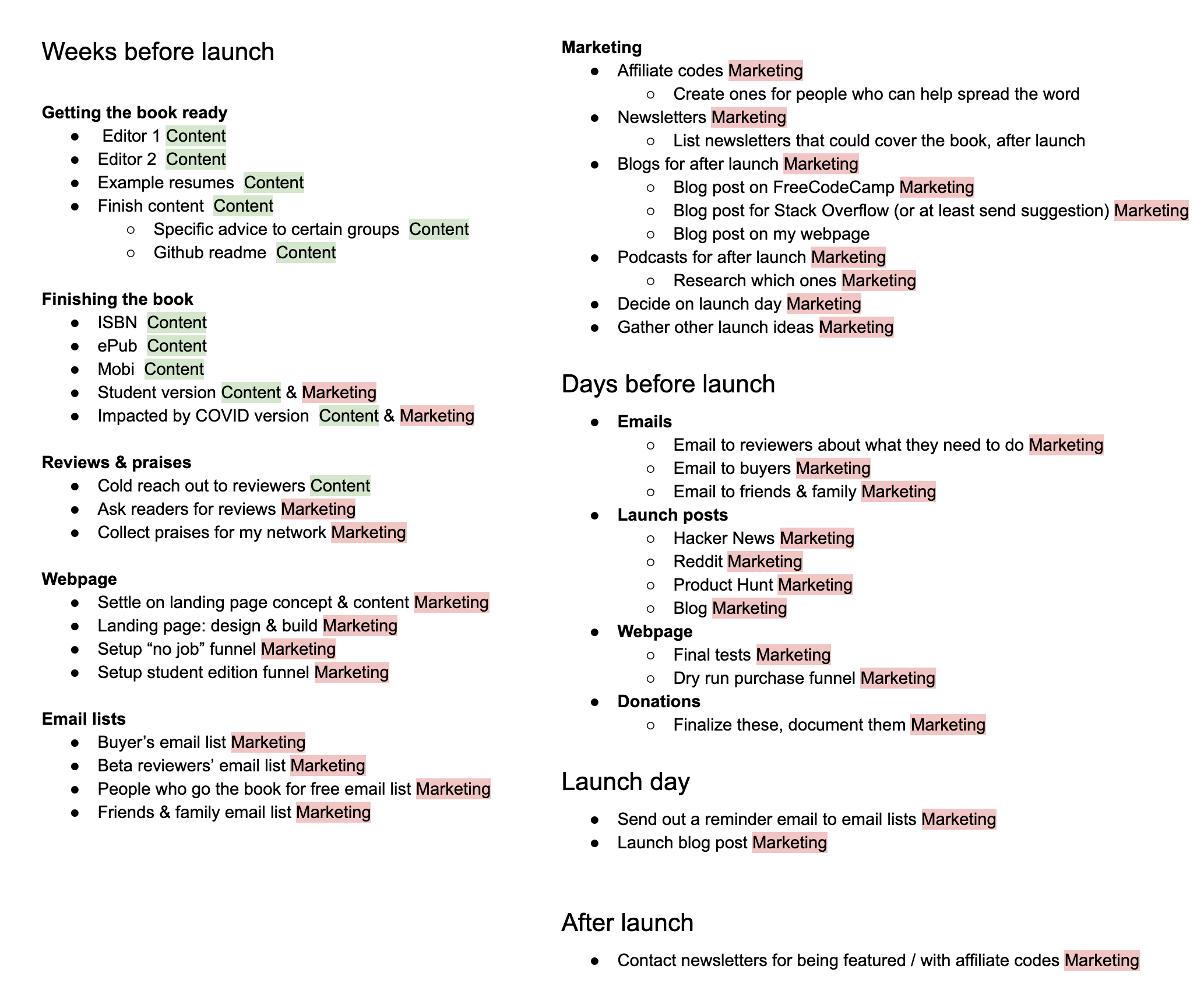
Your Own "Marketing" Network Only Goes So Far
I spent an additional month only focused on marketing activities. These ranged from the building - and refining - a landing page, funnels to claim the book for free, collecting testimonials and other activities. Then, after delaying the launch for three weeks straight, most things were ready. I pushed the launch button and sent out the launch messages on various channels: Twitter, LinkedIn, Facebook.
The launch within my own network generated buzz on my social media channels with many reshares. It brought about 2,700 visitors to the landing page, generating nearly 200 sales and nearly $2,900 in revenue (sales included free books for developers without jobs).
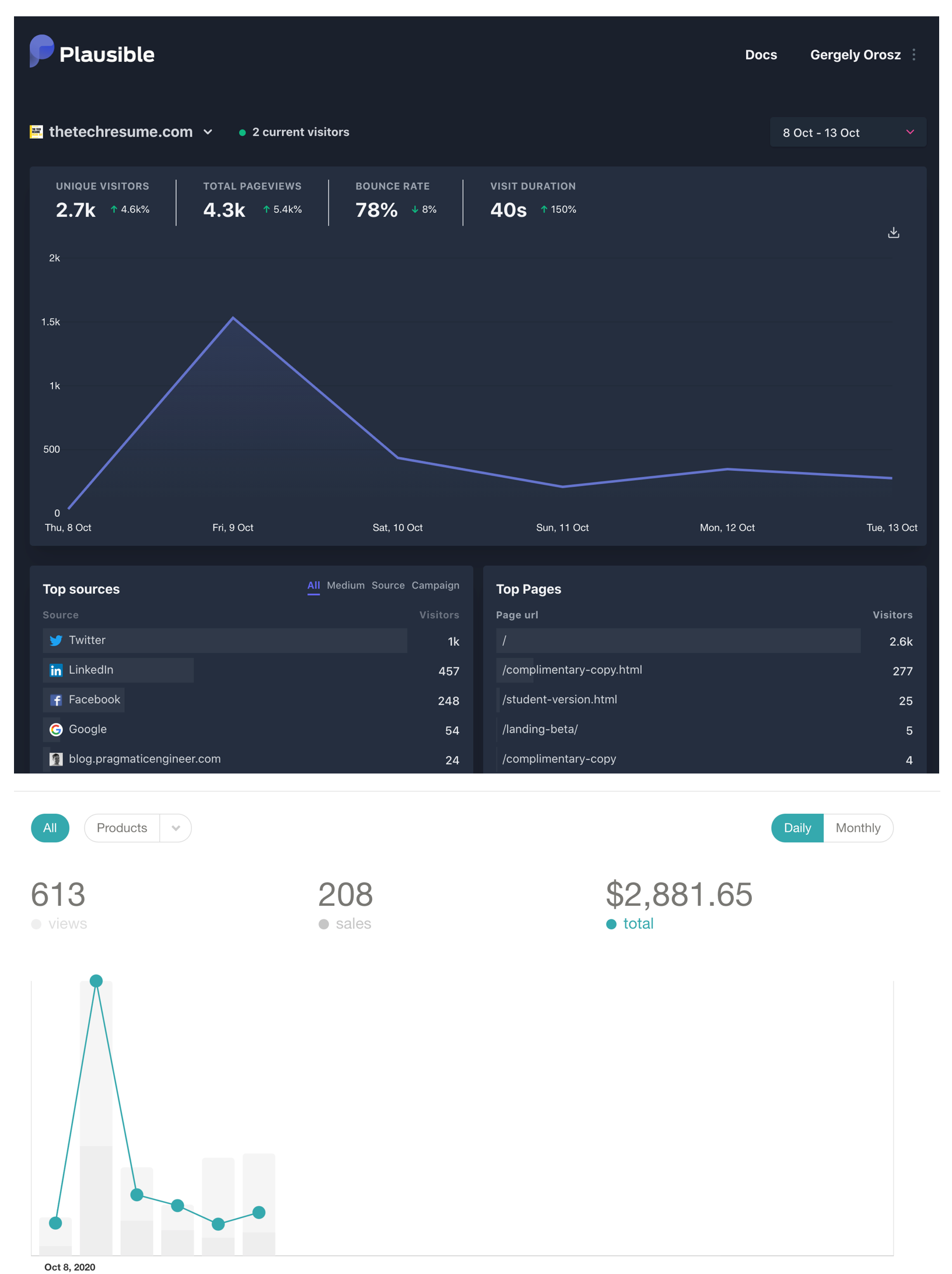
Launch statistics for The Tech Resume Inside Out: What a Good Developer Resume Looks Like
The sales funnel visitors going through the funnel of visitor -> interested -> customer is something I saw plenty of times on my day job. Still, I found myself paying more attention to this one far more than I have done in the past.
This funnel very directly impacted me - and my bank account. This was despite not having any real goals on revenue or reach. Once orders started coming in, I started to look into how and why purchases might have happened, where traffic was coming from, and other "investigative" work. I looked up what typical conversions are for e-commerce and book sites and whether my 5% is considered good, average, or poor.
2. Media Exposure
A week after launch, I ironed out a few rough edges on the landing page and felt ready to submit to Hacker News. The content was relevant to this crowd. I wrote a Show HN post, then crossed my fingers... and with luck, the post ended up upvoted, and eventually on the front page of Hacker News.
Hacker News is an example of a channel that attracts far more eyeballs than most internet forums. My personal network across various social media channels generated 2,700 visits to the book's landing page. Hacker News 2-3x'd this traffic in two days, with at least 7,000 visitors coming from this site. The book sold 2.5x the quantity of the previous launch:
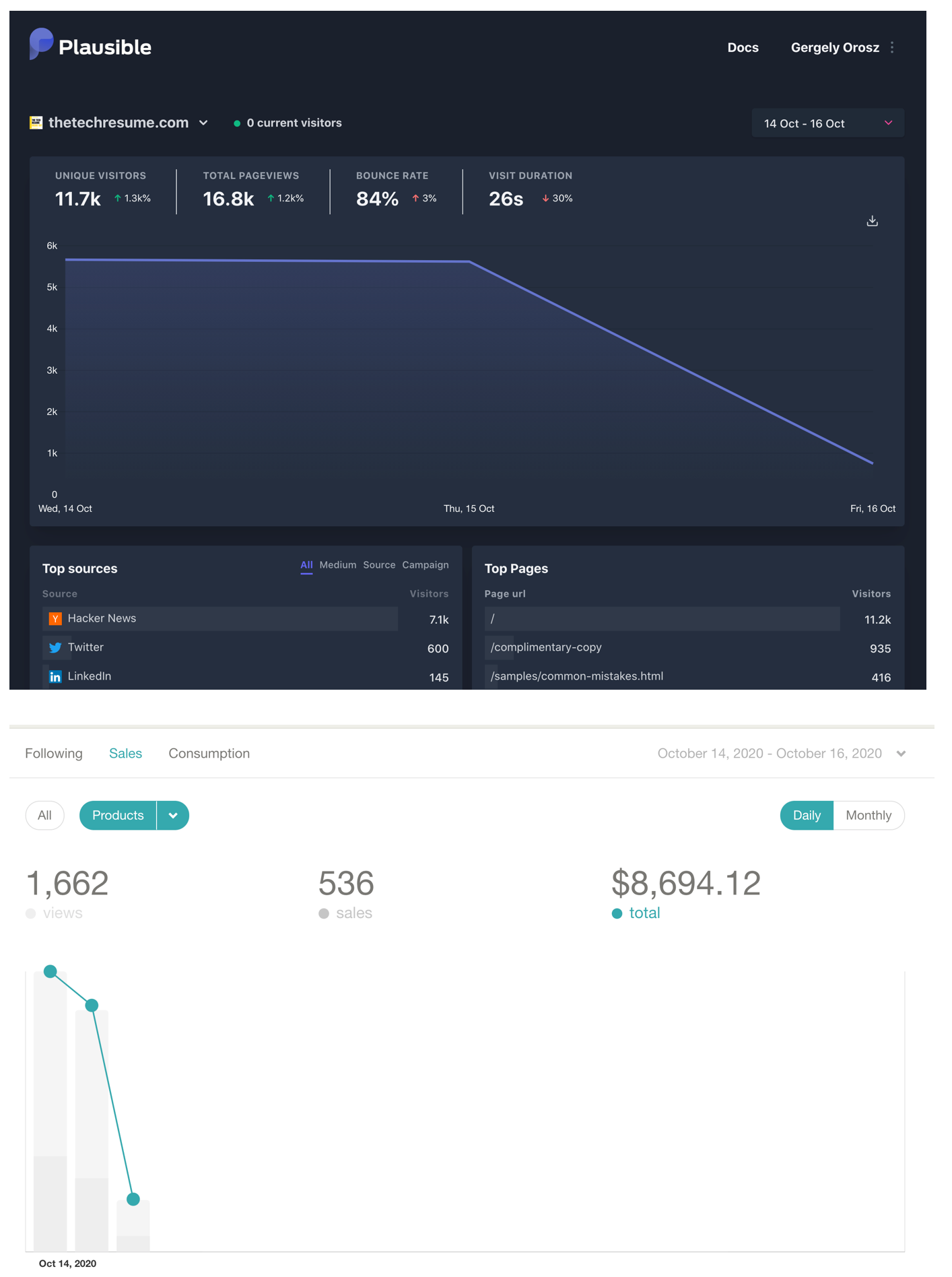
The impact of the Hacker News Launch for The Tech Resume Inside Out
Media exposure is an incredibly powerful tool to drive sales. It's one that can be difficult to deliberately get exposed to - I needed luck to get upvoted on Hacker News - but it's usually free or cheap compared to its impact.
A similar - though much more impactful - example was how Traf Icons saw over $250K in sales after MKBHD - a YouTuber with over 13M subscribers - made a video with over 7M views of him installing these icons. This kind of exposure - may this be online, on YouTube, traditional media, or other outlets - is a reminder of how powerful exposure can drive people's attention to what you create.
Most of the World Doesn't Know - or Care - About Your Product
Following the Hacker News launch, sales have dropped - as expected - and been steady since. If this was a paid book, this would not be anything unusual.
However, despite the book being free for engineers not having a job, most people will never know about this resource. Not unless some accidental media exposure happens, or unless I spend a combination of money, time, and effort in marketing to get in front of them.
No matter how good your product is, people won't "come" and get it, even if it's free. This book is probably the best free resource in 2020 / 2021 if you're out of a job and want to get one. It's probably one of the best price-for-value paid resources at a lower price point and Purchase Power Parity support. Still, none of this matters.
"Build it, and they will come" doesn't work for ebooks, and it's not a viable strategy for most businesses - save for a few outliers. I'm glad I experienced this lesson first-hand. Should I go down the path of starting a business, the sales and marketing funnels are something I'll be thinking much more ahead than I would have otherwise done.
Newsletter
Subscribe to my weekly newsletter for weekly articles with observations and deep-dives about the software engineering industry. It's the #1 technology newsletter on Substack and this is what people say about it.
3. Advertising
I've used adblockers for years, being fed up with how slow and annoying webpages were without them. Being someone who knew how targeted advertising works, I also thought myself of being "immune" to these ads, for the most part. And I definitely thought they were more annoying than useful or necessary.
If I would be selling my product for a living, I would reconsider my stance on advertising: I'd need it. The product is 95% finished and it's good. People are reading the book, finding it useful and even recommending it to others. However, the majority of my target market doesn't know about the existence of this resource. If I was to "scale up" awareness, I'd have to turn to ads.
So far, I've spent $40 on advertising, which turned out to be a waste. On launch, I decided to give Twitter's Promoted tweets a go to with my launch tweet to see what happens. The $40 spent got me an additional 8K views, with a 15 click through to my site, and no sales. The process of buying ads on Twitter was also surprisingly difficult: my account went into some weird limbo for half an hour, where I couldn't pay for ads, or checkout. Reporting is also terrible: the only place I could see stats was on the tweet itself: the advertising interface was clearly built for large campaigns, not one-off promotions like I did.
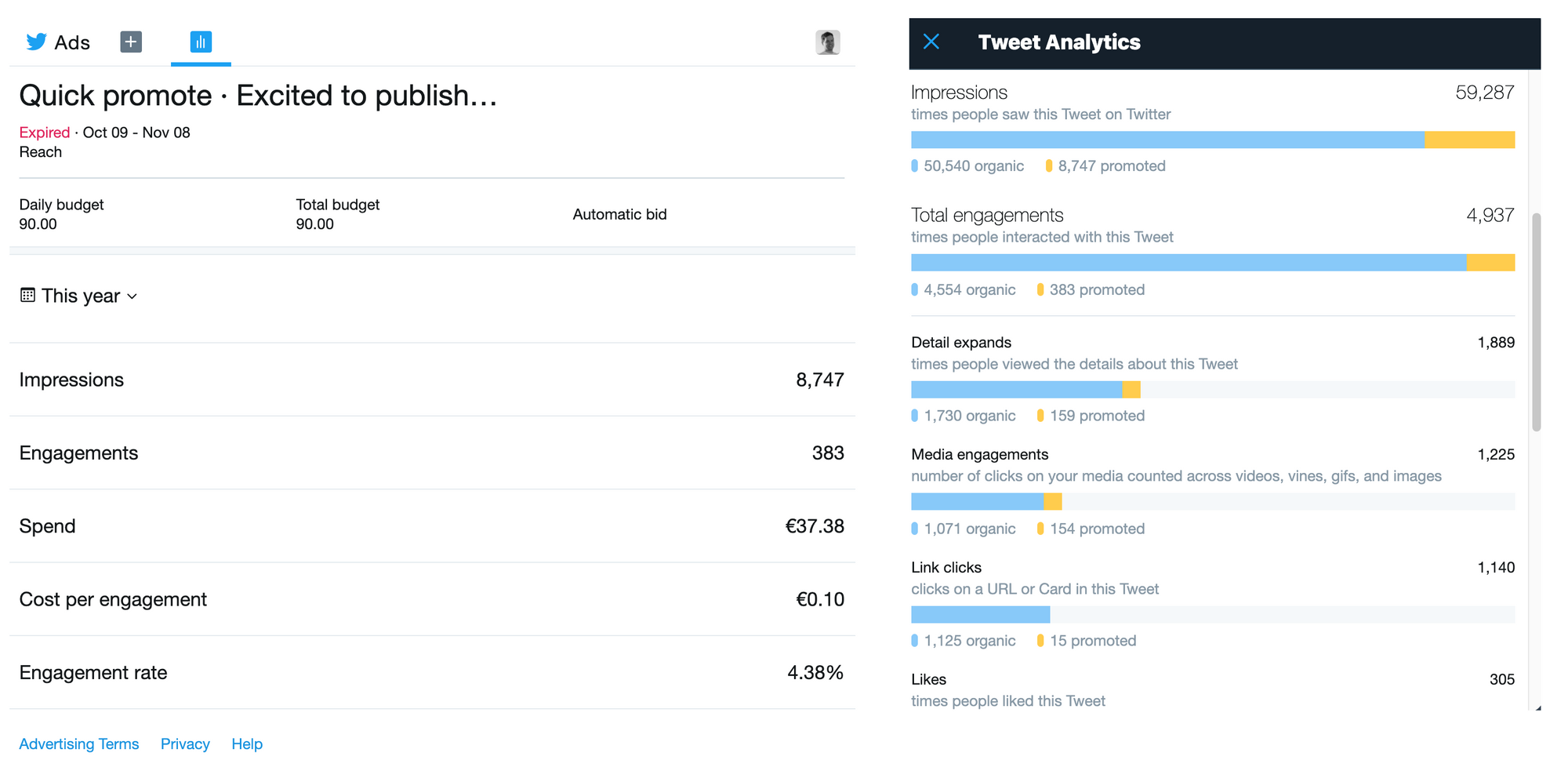
Twitter's ads interface (left) and the stats on the tweet (right). If found the interface to be confusing and the €37 spent on advertising brought clicks at around $3/click, but no sales. Pulled the plug on advertising, for now.
Customer lifetime value is a reason I'm hesitant to enter advertising - on top of not having much interest in maximizing my revenue. With The Tech Resume Inside Out, I'd be competing directly with services that have a higher customer value, like TopResume and their $200+ resume reviews, or resume sites that earn at least $100 per paying customer. I couldn't realistically compete on popular search terms with these competitors.
4. Content Marketing and Growth Hacking
Growth hacking and content marketing are areas I knew little about - apart from annoying emails coming to my blog, with people asking me to add links for free or for a price - emails I always ignored.
It turns out that when advertising is expensive - which, you would discover the case - instead of blowing $50K on ads, you could hire a "growth hacker" who would try to generate more traffic for the same amount. Growth hackers would then post on forums, email website owners, write articles, and so on. Some of the methods are shady, some straight unacceptable - like impersonating being a software engineer just to get access to a members-only forum, then post links to the company's articles.
I don't like what I'm seeing in the content marketing and growth hacking fields: generating shallow content or joining communities just to advertise. I get that the results might make financial sense, but I don't approve of many of these methods.
There are growth hacks that I'm amused at, such as how Pinterest "hacked" Google's image search, rendering it virtually useless while driving tons of traffic to their site, and fuelling their growth on top of it. I find this example ingenious, and the ball is now with Google. It's their job to make their image search work well, and it's clearly not functioning as it should after this "hack".
I've done a little "content marketing" - writing a guest blog post on Stack Overflow, and one on Freecodecamp with condensed resume advice. I've not done - and not planning to do - "growth hacking."
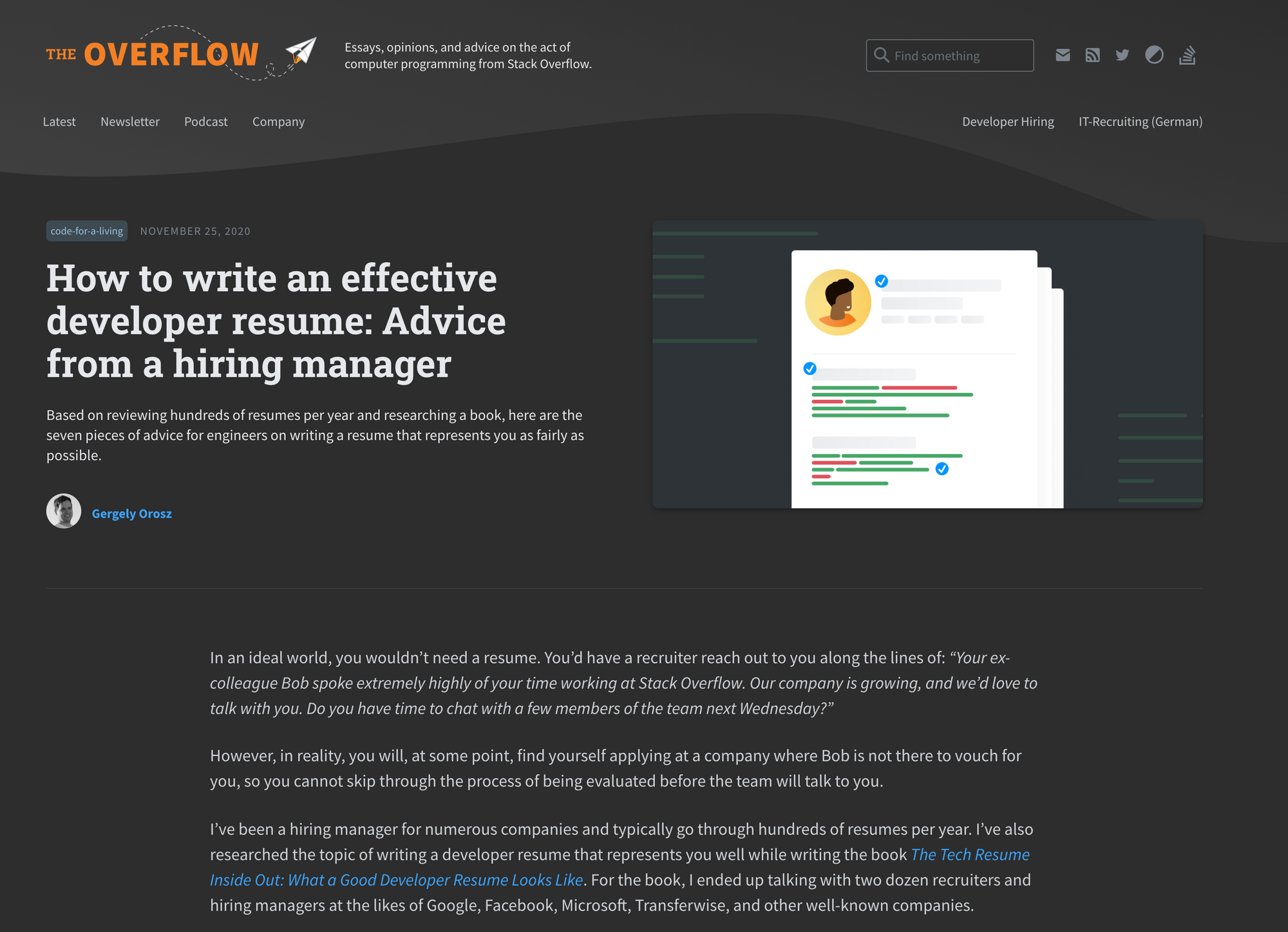
My guest blog post on resume advice the Stack Overflow blog.
5. SEO Optimization
SEO optimization - ranking higher on Google - is a final and obvious traffic source. I wrote a book on software developer resumes, and it's one of the two books on this topic, together with The Google Resume by Gayle Laakmann McDowel. Let's see if people can find my book when they search "developer resume":
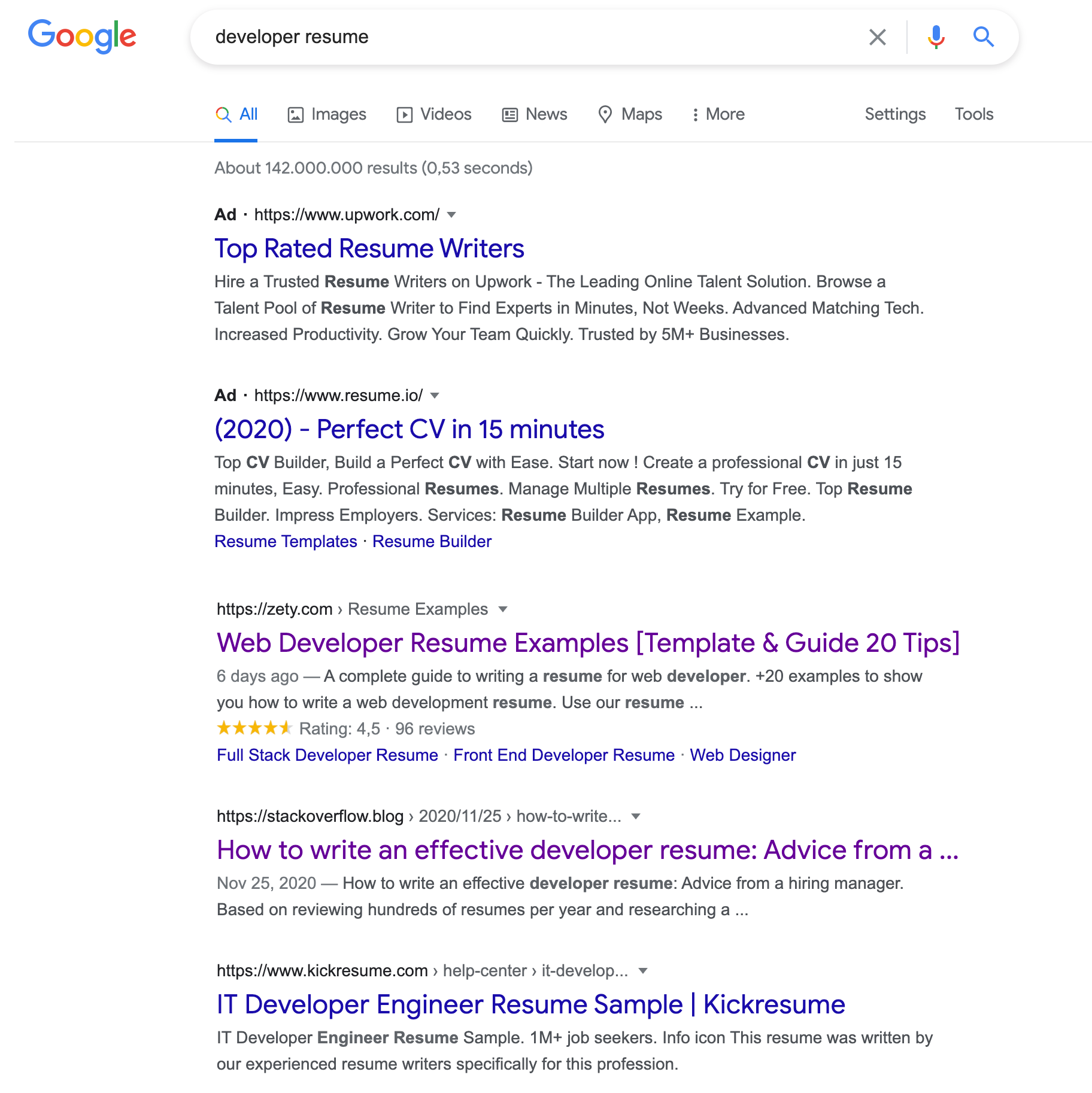
Search results for "developer resume"
Not really: The Tech Resume Inside Out isn't in the top 5 pages. Interestingly enough, the Stack Overflow article I wrote in the second organic hit, following the two ads. This probably has to do mainly with the strong domain ranking of stackoverflow.com, and in a smaller part on how the editorial team re-edited the title and content of the article to be more SEO friendly
Optimizing for SEO - and its impact on product discoverability - was something I never thought too much about before. This is despite this blog getting a fair amount of Google traffic.
Unfortunately, so many players are playing the SEO game that your product has a slim chance to be discoverable: unless you start playing the exact same game as well. You have to play catchup, though, as your competition has already invested time and money in content, backlinks, analyzing the longtail of keywords, and using SEO tools like ahrefs or Moz and many others.
The amount of money that can be spent on SEO, and the variety of SEO tools surprised me. There's so much money and tools exactly because SEO can drive future customers cheaper than any other channel - when done right and long enough.
I knew about SEO thanks to my Skyscanner days. Skyscanner had a whole team focused on ranking in the top 3 for "{City} to {City} flight" for all possible permutations. They generated landing pages, had inbound links to them, and generated what would have cost millions in search traffic. Things went well until Google rolled out Google Flights, and put their flight picker on top of all these hard-earned first results:

Spending lots of money on SEO can be worth it - until Google decides to launch a business competing directly with you
I don't expect Google to launch a resume book anytime soon. At the same time, I have failed to get meaningful traction for Google search terms. Still, the book is #1 for "Developer resume book," which I'm happy with for now.
My take on ranking well on Google are these 3 steps:
- Have lots of inbound links: from sites with more PageRank / domain authority, the better.
- Have good titles and metadata, so people click through on the search page.
- A bunch of other things you can spend hours with: as a software engineer, I'd recommend the email course Blogging for Devs and the SEO advice in this module.
Unfortunately, two decades of SEO optimization is slowly turning Google unusable for many popular search terms. Searching for "resume" or its variants are a good example: the first few pages will yield resume sites with dark patterns.
Ironic enough, I'm not sure I wouldn't be contributing to the problem if I joined the "SEO game". For now, I'm not doing anything here: it's a lot of effort, and I have little interest in this project. Still, if I was running a business, I'd have to decide how much I'd spend here and how much I'd want to compete with my competitors to get in front of potential customers.
6. Customer Support
I launched my book with a common policy of no-questions-asked, 30-day refunds. If people are unhappy, I'd rather they get their money back.
I've found it a challenge to get feedback from customers on what they missed or did not like about the product. My sample size is small, with 5 refunds. 3 of these never responded after I refunded and asked what they missed. One person said they were in a different industry and wanted to see if the book would help them, and it didn't. Another person was hoping for a more specific example on bullet points - at least this one, I could work with.
Because I'm not set on revenue, I have no issue sending a refund. However, if I was running a company, selling a product, I'd invest more in this area. A lost customer is one thing, but losing more customers due to the same issue you're not aware of is another.
I'm far more empathetic on why companies with great, in-house customer support often fare better, Zappos being a frequently quoted example. At the same time, I am far from being an expert in what good customer support looks like. Starting a business, I'd want to be involved in all customer complaints to get a sense of where things go wrong.
7. Accounting: Get Familiar With It
I set up my company before self-publishing and started to tally expenses and income. I've had side income for years - through blog adverts and Amazon affiliates for the past few years - so I'm used to this.
Setting up a structure to work yourself helps you learn about the business side of things that you might not be used to, as an employee getting the steady paychecks: bookkeeping and accounting. Deciding whether to expense something that is related to your business. Claiming back VAT. Paying taxes on profits.
Now that I've left Uber and my first book brought a considerable amount of sales, I had to decide what legal structure I choose to carry on. Do I keep working as a sole proprietor? Or set up a company, employing myself? What is the overhead of the company? If I hire myself, how do I pay payroll and where do I transfer payroll taxes, and how often?
So, About That Business Idea
Publishing and selling a book online felt like a bootcamp on launching and marketing a business. I learned more by doing than I did reading, and I can relate to parts of the business lifecycle that felt alien before. I got first-hand experiences and dug into learn more - as I had to! - about these areas:
- Marketing
- Media exposure
- Advertising
- Content marketing and growth hacking
- SEO optimization
- Customer support
- Accounting
If you're considering starting a company: sell something online first to get a better feel of all the other things you'll need to focus on top of building a product. This experience has only made me more excited about doing something from scratch: and I'll use many of the lessons learned as I launch the Building Mobile Apps at Scale book and then The Software Engineer's Guidebook.
And then, who knows what will come next, where I can use all these first-hand experiences?